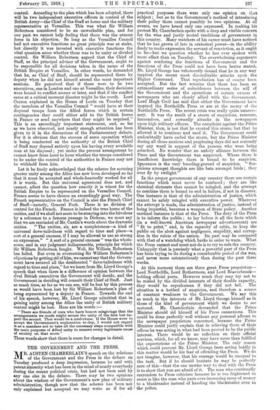THE GOVERNMENT AND THE PRESS.
"UR: AUSTEN CHAMBERLAIN'S speech on the relations -MK. of the Government and the Press in the debate on Tuesday produced a deep impression, because he said with patent sincerity what has been in the mind of nearly everybody during the recent political crisis, but had not been said by any one else in the debate: There may be two opinions about the wisdom of the Government's new plan of military administration, though now that the scheme has been not only explained but accepted we may write as if for all practical purposes there were only one opinion on that subject ; but as to the Government's method of introducing their policy there cannot possibly be two opinions. At all events, we have heard only one expressed. In making his protest Mr. Chamberlain spoke with a deep and visible concern for the wise and justly rooted traditions of government in this country. Many watchers of his career must have noticed that he has grown of late in oratorical power—in the ability finely to make expression the servant of conviction, as it ought to be—but we question whether he has ever spoken with more effect than on Tuesday. The overwhelming arguments against confusing the functions of Government and the functions of the Press could not have been , better stated. Mr. Lloyd George has vehemently denied that he in any way inspired the recent most discreditable attacks upon the Higher Command. That repudiation has of course been accepted: But the fact remains that there has been an extraordinary series of coincidences between the will of the Government and the operations of certain owners of newspapers who are closely allied with the Government. Lord Hugh Cecil has said that either the Government have inspired the Northcliffe Press or are at the mercy of the Northcliffe Press. The recent crisis was really quite unneces- sary. It was the result of a storm of suspicions, rumours, innuendoes, and cowardly attacks in the newspapers upon high military officers. The complaint against the Prime Minister, then, is not that he created this storm, but that he allowed it to continue and used it. The Government could undoubtedly have ended the storm, but the Prime Minister during all those anxious and perplexing days did not seriously say any word in support of the persons who were being attacked. No wonder that an unholy alliance between the Press and the Government was suspected. Where there is insufficient knowledge there is bound to be suspicion. Ignorance is the very breeding-ground of suspicion. "Sus- picions amongst thoughts are like bats amongst birds ; they ever fly by twilight."
In the proper government of any country there are certain functions which must never be confused ; they are like chemical elements that cannot be mingled, and the attempt to combine them is bound to end in failure, if not in disaster. One instance is that of the administration of justice, which cannot be safely mingled with executive power. Wherever the attempt is made, the administration of justice, instead of being impartial, becomes a weapon of State policy. Another cardinal instance is that of the Press. The duty of the Press is to inform the public ; to lay before it all the facts which (in a well-known American newspaper advertisement) are "fit to print," and, in the capacity of critic, to keep the public on the alert against negligence, stupidity, and corrup- tion in the rulers of the nation. Its part may be compared with that of a watchdog which barks in order to warn. What the Press cannot and must not do is to try to rule the country. Unhappily that is precisely what a powerful part of the Press has been trying to do during a considerable period of the war, and never more ostentatiously than during the past three weeks.
At this moment there are three great Press proprietors— Lord Northcliffe, Lord Rothermere, and Lord Beaverbrook- holding official posts. However much they may try not to be misled by the divided interests of their double capacity, they would be superhuman if they did not fail. The situation is a hotbed of suspicion, and therefore a source of constant weakness to the Government. We say this as much in the interests of Mr. Lloyd George himself as in those of the kind of government which we desire to see restored. Mr. Chamberlain demanded, that the Prime Minister should rid himself of his Press connexions. This could be done perfectly well without any personal affront to the newspaper proprietors concerned, because the Prime Minister could justly explain that in relieving them of their offices he was acting in what had been proved to be the public interest. There would be no reflection on their official services, which, for all we know, may have more than fulfilled the expectations of the Prime Minister. The only reason which could prevent Mr. Lloyd George from acting boldly in this matter would be his fear of offending the Press. We do not imagine, however, that his courage would be unequal to the task. But if he should hesitate he may be perfectly sure of this—that the one unwise way to 'deal with the Press is to show that you are afraid of it. The man who continually surrenders to Press criticism because he is too frightened to resist is like the man who pays ever-increasing sums of money to a blackmailer instead of handing the blackmailer over to the police.


























 Previous page
Previous page